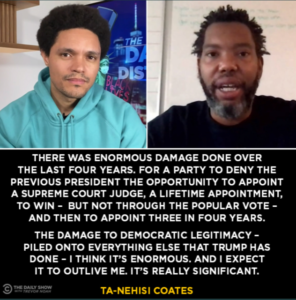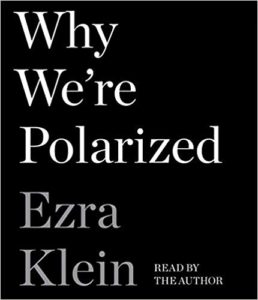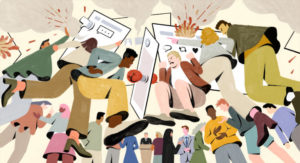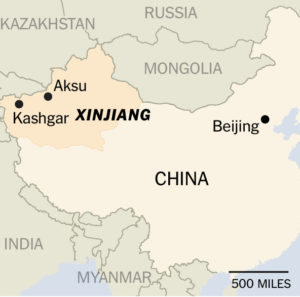Chris Hayes
A Black president, Birthism, Tea Party, Insurrection
January 12, 2021“And then I remember Obama’s words, after the murder of George Floyd, to the effect of: “Think of what it takes for a black person to love America.” And it makes me weep.”
-Francis P Detweiler
‘It feels sometimes like we’re dragging America kicking and screaming toward its own creed.’ Baratunde Thurston explains how Black Americans show up for America and implores Republicans and others to, ‘join us because we’ve been fighting this a long time.’
Black Americans consistently show up for this nation an implores Republicans and other Americans “join us because we’ve been fighting this a long time.” [MSNBC]
-Baratunde Thurston
Link to Baratunde’s soundbite:
Recently posted podcast, Why Is This Happening, with Ta-Nehisi Coates and host Chris Hayes:
‘One day after the attack on the Capitol, Chris Hayes and author Ta-Nehisi Coates sat down to process what we witnessed as a nation and what it reveals about the fragility of American democracy.’
RELATED READING:
Twilight of the Elites: America After Meritocracy by Chris Hayes
We Were Eight Years in Power: An American Tragedy by Ta-Nehisi Coates
The Water Dancer by Ta-Nehisi Coates
‘You cannot stand for “law & order” while waving away lawlessness, or champion the pro-life cause while waving away murder. You cannot support police by the murder of police officers. You cannot support religious liberty by trashing the US Constitution.’
-Russell Moore
‘Last week’s attack on the US Capitol was like watching the death flowering of a rotten right-wing ideology. A death flowering tree might look bright and draw attention, but that very flowering signals it’s actually diseased and rotten to its core.’
‘It might take months or years, but the tree is doomed. Those rioters are the death flowers of a racist patriarchy. Their chaotic growth, bursting energy with no direction, the urgency against losing entitlements, and the omni-directional anger based on lies.’
-Eric Holthaus
“Certainly anyone who has the power to make you believe absurdities has the power to make you commit injustices.” (Certainement qui est en droit de vous rendre absurde est en droit de vous rendre injuste. [Beinecke Library/Yale]
-Voltaire. Questions sur les miracles, 1765.
MAY NEW LEADERS ARISE.
1918 & 2020
April 8, 2020Credit…via Library of Congress, via Associated Press
Why Is This Happening with Chris Hayes
https://www.stitcher.com/podcast/msnbc/why-is-this-happening
The Last Great Pandemic with John M. Barry
‘What did we learn from the last great pandemic? You don’t have to dig deep into the 1918 influenza before finding eerie similarities to today – be it the White House downplaying the severity of the virus or the social distancing measures recommended by public health officials. Author John M. Barry’s meticulously researched account of the 1918 pandemic in his book “The Great Influenza” was so affecting that it inspired then President George W. Bush to develop a comprehensive pandemic plan after reading it. There’s no one better to discuss the similarities and differences to what played out a century ago – and the far reaching reverberations this moment will have – than John M. Barry.’
“The failure of the government in this is incomprehensible.
We don’t have a plan.”
-John M. Barry
#MustListen #COVID19US #withpod
NYTimes
The Single Most Important Lesson From the 1918 Influenza
“A dysfunctional whole.”
February 11, 2020“The American political system—which includes everyone from voters to journalists to the president—is full of rational actors making rational decisions given the incentives they face,” writes political analyst Ezra Klein. “We are a collection of functional parts whose efforts combine into a dysfunctional whole.”
He traces the feedback loops between polarized political identities and polarized political institutions that are driving our system toward crisis.
#MustListen
Three podcasts:
- On Being with Krista Tippett
- Why Is This Happening with Chris Hayes
- Ezra Klein Show interviewed by historian Jill Lepore
[If you can only listen to one, please choose On Being with Krista Tippett. Beyond the exemplary content, it’s worth noting the calm Krista brings to Ezra’s atypical tempo. She is seemingly able to, through conversation, slow his often rapid delivery allowing reflection, pause and spiritual insight.]
Ezra Klein — How We Walked Into This and How We Can Walk Out
Journalist Ezra Klein has been widely interviewed about his new book, Why We’re Polarized. In this conversation, he’s frank and reflective about what’s at stake in human terms in this political moment. And he describes how we all — Democrat and Republican, journalist and citizen alike — walked into this as a way to trace our steps out of it.
What are the structures that shape people’s decision-making? What are the structures that lead us to be who we are? I think that we often have an illusion that we made a choice for ourselves, when that choice was so fundamentally shaped by who we are and where we grew up and what was around us and what made sense for us to do, that in some final accounting, it was really almost never a choice at all. And I think when you look at the world like that, then it becomes very, very deeply important — it becomes of central importance — that those systems are just and that, in some big way, we are helping people who were born into, or who fell into, the wrong systems.
one of the really radicalizing things for me in the past couple of years has been this question, and it came a lot from my political reporting and talking to members of Congress and watching other journalists and starting Vox, of just: Have we built a system that has structured itself such that it is, at the very least, very hard for people to express the best versions of themselves within it? And I think we have.
I talk about this interview I did with President Obama, in the book. And I talked to him about polarization, and he’s somebody — I interviewed him many times, and I have great admiration for him. And he’s somebody who, I think, in a very deep way, believed that America could overcome its polarization, believed that a lot of that polarization was illusory. And I asked him about it, because at that point in 2015, when we had this discussion, he was quite polarizing. And I asked him about this. And he said, well, look: We all know that we’re one way in politics, but then, when we’re on the soccer or the little league field together, or we’re at the PTA meeting, or we’re talking to our neighbors, or there’s been a storm, we’re very different than that. And so, yeah, then, maybe, when you talk to that person about politics, you can’t believe what they’re saying, but then you look beyond that, and they’re good people. This country is full of good people.
In the past couple of years — and it was actually at the recommendation of Varshini Prakash, who is the executive director of the Sunrise Movement, the climate change movement — I had a conversation with her on my show, and I asked her, what does she do when she thinks about failure? And she said that every day she reads some of the Tao, the Tao Te Ching. And I thought, that’s a strange answer. And so I went, and I had not read it since I was young, when I didn’t get anything out of it.
And this time when I read it, I was really, really, deeply struck by its ideas of non-dualism, its challenge to think about everything is also encoding its opposite. And so much of how we are taught to think — I just think in general, but very much in politics — is, things are one way. They are right, or they are wrong. We got it right, or we got it wrong. This person won, and this person lost. It’s a clean equation that has one answer, every single time. And the deep truth about the Obama presidency is that the DT presidency was within it …
Krista:
And this time when I read it, I was really, really, deeply struck by its ideas of non-dualism, its challenge to think about everything is also encoding its opposite. And so much of how we are taught to think — I just think in general, but very much in politics — is, things are one way. They are right, or they are wrong. We got it right, or we got it wrong. This person won, and this person lost. It’s a clean equation that has one answer, every single time. And the deep truth about the Obama presidency is that the DT presidency was within it …
Chris Hayes:
The title says it all on this one, folks. What is it about the American political system that cultivated this deeply dysfunctional and polarized climate? Last year, we had Ezra Klein on the show to assess how bad things were in the Trump era (conclusion: not great). Now, Klein is back to discuss his new book “Why We’re Polarized” which provides a systematic look at the deep structural defects in American democracy that are manifesting themselves in two coalitions that are increasingly at each other’s throats.
Ezra Klein:
Jill Lepore on what I got wrong.
Jill Lepore is a Harvard historian, a New Yorker contributor, the author of These Truths, and one of my favorite past guests on this show. But in this episode, the tables are turned: I’m in the hot seat, and Lepore has some questions. Hard ones.
This is, easily, the toughest interview on my book so far. Lepore isn’t quibbling over my solutions or pointing out a contrary study — what she challenges are the premises, epistemology, and meta-structure that form the foundation of my book, and much of my work. Her question, in short, is: What if social science itself is too crude to be a useful way of understanding the political world?
But that’s what makes this conversation great. We discuss whether all political science research on polarization might be completely wrong, why (and whether) my book is devoid of individual or institutional “villains,” and whether I am morally obliged to delete my Twitter account, in addition to the missing party in American politics, why I mistrust historical narratives, media polarization, and much more.
This is, on one level, a conversation about Why We’re Polarized. But on a deeper level, it’s about different modes of knowledge and whether we can trust them.
https://podcasts.apple.com/us/podcast/jill-lepore-on-what-i-get-wrong/id1081584611?i=1000464782668
“The first part of doing anything is letting people know it’s happening.”
May 1, 2019“Partly insulated from the rest of the Islamic world, the Uyghurs constructed a local history that is at once unique and assimilates elements of Semitic, Iranic, Turkic, and Indic traditions–the cultural imports of Silk Road travelers. Through both ethnographic and historical analysis, The Sacred Routes of Uyghur History offers a new understanding of Uyghur historical practices, detailing the remarkable means by which this people reckons with its past and confronts its nationalist aspirations in the present day.”
Journalist and MSNBC host Chris Hayes:
“Did you know there are roughly one million people currently held in internment camps in China? One million people detained against their will, facing no criminal charges, cut off from the outside world. This is the story of the Uyghurs, a small insulated ethnic minority in Western China. The predominantly Muslim group has faced growing levels of Islamophobia and paranoia from the Chinese government. Right now, roughly ten percent of the Uyghur population has been ‘disappeared’, held indefinitely in re-education camps where they are subjected to totalitarian indoctrination in an attempt to erase their identity, their language, their religion and their culture. Rian Thum, who has spent his career studying the Uyghurs, joins us to explain everything we know about the camps and how they came to be – including the prison-like surveillance state that Uyghurs outside of the camps are forced to live in.”
CHRIS HAYES: That’s the thing that I keep thinking about, that keeps haunting me. The reason I’ve been wanting to talk to you is I know this is going on. It’s sort of in the corner of my head, what if the Chinese state just said, “Well, you know what? The indoctrination’s not working. We’re just gonna execute 1,000 of these folks a day.”
RIAN THUM: Yeah, that really worries me, too. I think at some point, they are going to confront a failure of indoctrination. There’s … You can make people submit, but it’s very difficult to make them think differently. It might have some success, but there’s bound to be a large percentage of this million or so people who they determine to be failures and irredeemable, and I’m worried about what happens to those people.
You’ve brought up the Holocaust a few times, and I think there’s one place where that analogy is really important, and that is in examining intent and plans for the future. The German concentration camps, it was something like four of five years before the majority of the population in them was Jewish, and it was eight or nine years before they were connected to a program of mass killing. The reason I bring that up is that goals can change, and the function of these things can change, especially when you’re looking at such a massive system that has no appeal system, no regulation, no oversight. Who knows what the future holds? And we’ve already seen that the rest of the world’s reaction to this has been rather slow. I don’t think there will be time to react if it does take an uglier turn.
CHRIS HAYES: What chills me to my bones is, as far as I can tell, they’re doing it in plain sight and getting away with it in plain sight, and by that, I mean the camps, not something beyond that. But this totalitarian surveillance state they have erected on the backs of the Uighurs, outside the camps and the camps themselves, which are, I think … the largest internment camps that exist in the world at the moment.
https://www.stitcher.com/podcast/msnbc/why-is-this-happening/e/60217354
New York Times:
KASHGAR, China — Muslim inmates from internment camps in far western China hunched over sewing machines, in row after row. They were among hundreds of thousands who had been detained and spent month after month renouncing their religious convictions. Now the government was showing them on television as models of repentance, earning good pay — and political salvation — as factory workers.
China’s ruling Communist Party has said in a surge of upbeat propaganda that a sprawling network of camps in the Xinjiang region is providing job training and putting detainees on production lines for their own good, offering an escape from poverty, backwardness and the temptations of radical Islam.
But mounting evidence suggests a system of forced labor is emerging from the camps, a development likely to intensify international condemnation of China’s drastic efforts to control and indoctrinate a Muslim ethnic minority population of more than 12 million in Xinjiang.
Accounts from the region, satellite images and previously unreported official documents indicate that growing numbers of detainees are being sent to new factories, built inside or near the camps, where inmates have little choice but to accept jobs and follow orders.
After awareness? Boycotts. Products, like tomatoe used from Xinjiang make most brands of ketchup. Also, refusal to participate In Beijing for the 2022 Winter Olympics.
Rian Thum:
”I think we need to consider very carefully whether we want to support an Olympics that will be held in China in 2022 when they’re doing this to one of their ethnic groups. I can’t support it, and I would hope that people involved in the Olympics would consider this.”
The Uninhabitable Earth
March 6, 2019NEW YORK TIMES BESTSELLER
“The Uninhabitable Earth hits you like a comet, with an overflow of insanely lyrical prose about our pending Armageddon.”—Andrew Solomon, author of The Noonday Demon
‘David Wallace-Wells is a national fellow at the New America foundation and a columnist and deputy editor at New York magazine. He was previously the deputy editor of The Paris Review. He lives in New York City.’
“This is only a preview of the changes to come.
And they are coming fast.”
Like An Inconvenient Truth and Silent Spring before it, The Uninhabitable Earth is both a meditation on the devastation we have brought upon ourselves and an impassioned call to action. For just as the world was brought to the brink of catastrophe within the span of a lifetime, the responsibility to avoid it now belongs to a single generation. [Amazon]
An immediate and moral responsibility to engage in this conversation…an entry point being Wallace-Wells’ book & #WITHPod podcast, hosted by Chris Hayes. Here’s the link:
https://art19.com/shows/why-is-this-happening-with-chris-hayes
A young climate activist, Greta Thunberg, in this piece talks about learning the severity of Climate Change, being inspired by Rosa Parks.
Rolling Stone
https://www.rollingstone.com/politics/politics-news/climate-change-greta-thunberg-activist-803631/
Stacey, we’re listening.
February 26, 2019Stacey Abrams is the one politician I can listen to and feel like I can actually breathe. Put her on a ticket. Absolutely, #Senate.
LIVE: The Democratic Response with Stacey Abrams
If you want to get to the heart of the most fundamental question facing the Democratic Party right now – what is the future of the coalition – look no further than Stacey Abrams. Her historic 2018 campaign for Georgia Governor was built around her vision of how to turn out a progressive majority at the ballot box. And though she lost that election, suffice it to say her theory caught the attention of the country. Now, she sits down with Chris Hayes and WITHpod listeners to reflect on that hard-fought campaign against Brian Kemp, her vision for the party, and how she not only delivered but also embodies the Democratic response to DT. Will she run for Senate? For President? Would she go out on a date with Idris Elba? Listen to find out.
Email us at WITHpod@gmail.com
Tweet using #WITHpod
Thoughts.
November 28, 2018[Childe Hassam, 1917]
Intrigued by a statement from one of my students, the statement “politics of locations.” I finished listening to Serial Season #3: “Serial is heading back to court. This time, in Cleveland. A year inside a typical American courthouse. This season we tell you the extraordinary stories of ordinary cases. One courthouse, told week by week.” The season is centered in Cleveland, so as the host and writers focus on the criminal justice system, the listener also tours the neighborhoods of Cleveland, meeting people struggling with economics and oppression.
Hidden Brain, an NPR radio program, focused recently on how zip codes determine destiny. The name of the broadcast is titled, “Zipcode Destiny: The Persistent Power of Place and Education.”
https://www.npr.org/2018/11/12/666993130/zipcode-destiny-the-persistent-power-of-place-and-education
“People ask… is the American dream alive or not today? And I actually think the question itself is sort of ill-posed. The term ‘the American Dream’ — really we should think of it as ‘the Iowa Dream’ or ‘the Atlanta Dream’ or ‘the California Dream’ because there’s so much variation within this country.”
https://www.npr.org/2018/11/12/666993130/zipcode-destiny-the-persistent-power-of-place-and-education
And MSNBC host Chris Hayes recently discussing implicit racism and politics on his podcast, “Why Is This Happening?”, the DNA of racism, literally in the soil of America’s South.
“Hayes speaks with Maya Sen and Matthew Blackwell as they trace southern racial conservatism all the way back to glacial deposits.”
Particularly fascinating in context of the GOP Senate outcome in Mississippi.
From all of this the imprint of Impressionism…the human impressionism of the environment on personality and behavior: good begets good, bad begets bad.
Yes. Absolutely. “Human virtue vs. capitalism.”
Thinking of Elon Musk and his ‘neural lace’ project which is completely focused on the future and humans, “needing to become one with machines.” How about now? Can we fix ‘now?’
One of the final statement’s in season #3 of Serial continues to loop in my mind:
“Let’s all accept something’s gone wrong and work from that premise.”
Indeed.












